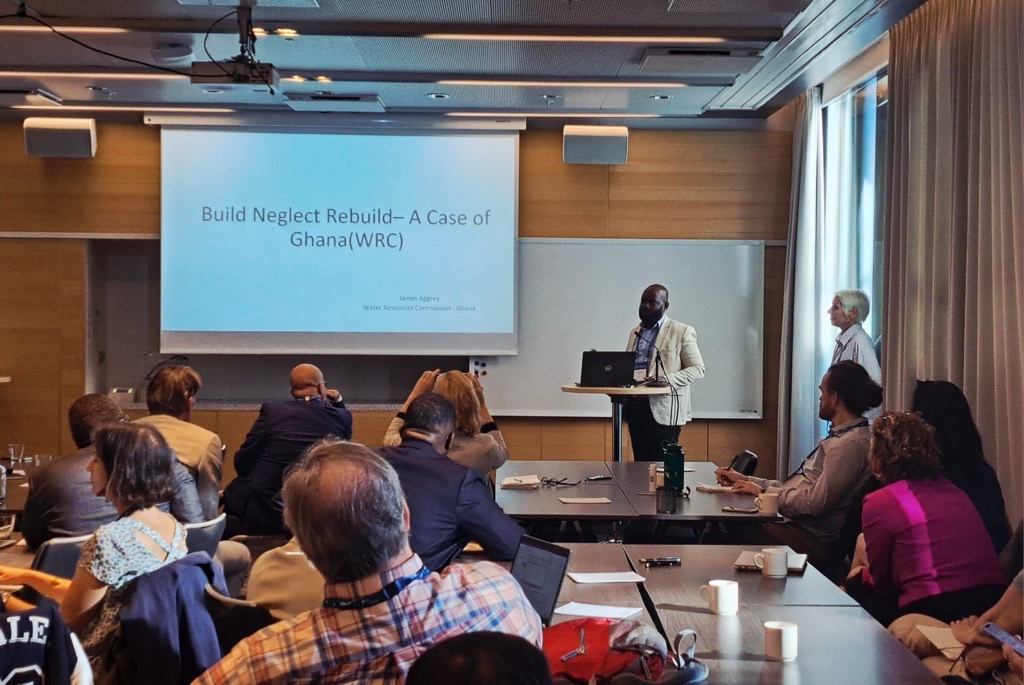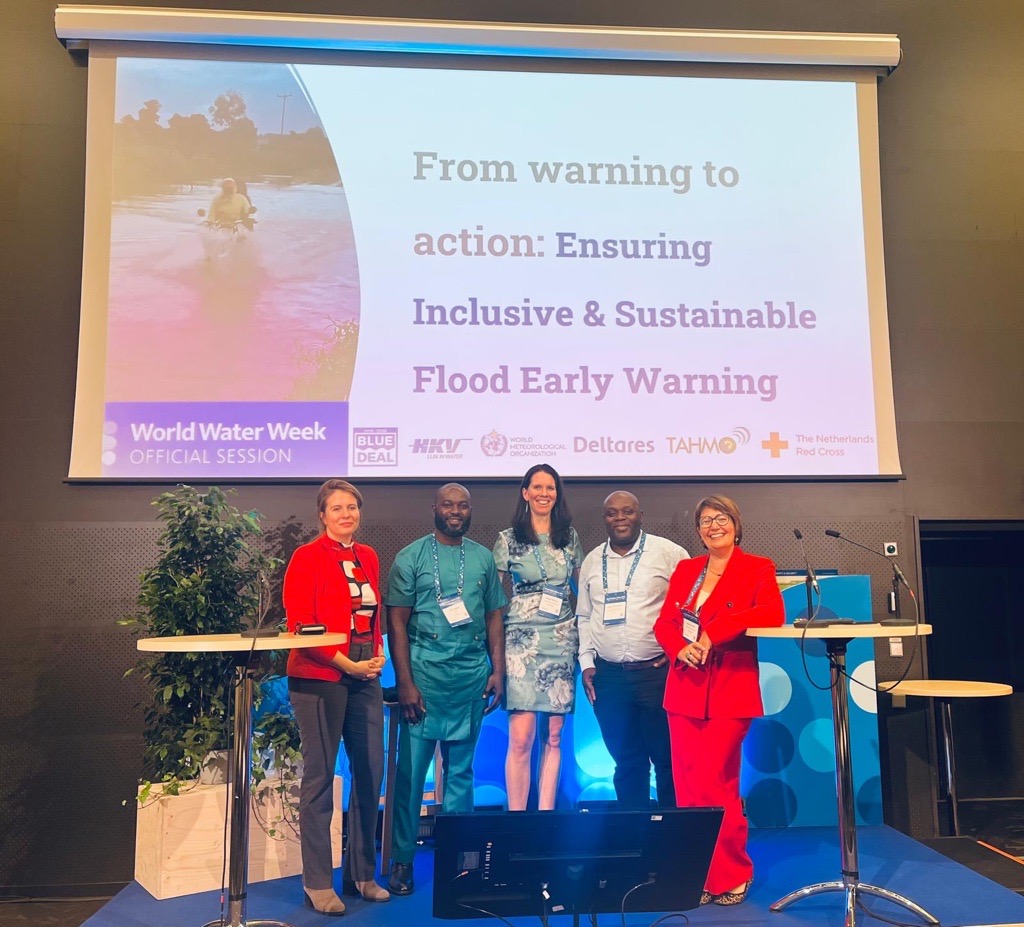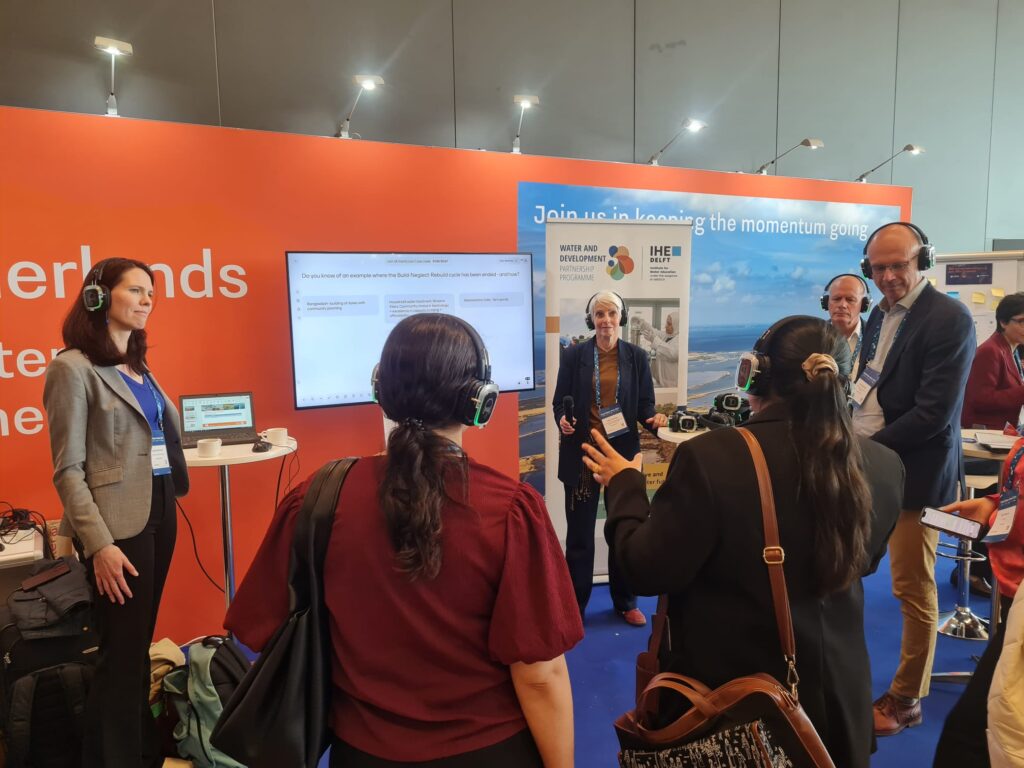At Stockholm World Water Week 2025, the Blue Deal programme was actively represented with Blue Deal team members from the programme office, Dutch water authorities and international Blue Deal partners. The week brought together key figures from the global water sector, allowing for fruitful discussion and relationship building with new and existing partners.
Aside from networking, the team contributed to three official sessions on important topics such as flood early warning systems, avoiding the build-neglect-rebuild cycle, and learning from past mistakes in water management. These all reaffirmed the important role water authorities play in addressing the world’s most pressing water challenges.
Key takeaways from the sessions

Pictured: James Aggrey (WRC, Blue Deal partner in Ghana) presents
Avoiding Build-Neglect-Rebuild: towards sustainable infrastructure
Organised together with WaterWorX and Partners for Water, this session highlighted the need for a mindshift in how we value infrastructure. Liliane Geerling (Partners for Water) moderated the session which addressed the lifecycle of water infrastructure and advocated for a shift in mindset from celebrating construction to valuing long-term maintenance. As Meike van Ginneken (Dutch Water Envoy), and Anjil Adhikari (Oxfam) emphasised: we must move from being proud of what we build, to being proud of what we sustainably maintain over decades.
Representing our Blue Deal partner in Ghana, James Aggrey (Water Resources Commission) reminded us to examine the origin of an infrastructure idea and whether it has broad support – from grassroots to high-level decision-makers. That support base is fundamental for long-term sustainability. Vikas Goyal of the Asian Development Bank stressed the importance of integratinglong-term operation & maintenance from the very start of a project, rather than leaving it as an afterthought.
An inclusive approach to flood early warning systems
This interative session, organised by Blue Deal, Red Cross The Netherlands, World Meteorological Organization (WMO), TAHMO, HKV and Deltares, was kicked off with an interview with Eva Schreuder of Inclusive Green Growth (Dutch Ministry of Foreign Affairs). During the session we explored how inclusive and effective flood early warning depends on strong collaboration – from communities, to water authorities, to disaster risk teams.

Pictured: Dorien Lugt (HKV), James Aggrey (Blue Deal/WRC Ghana, Liesbeth Wilschut (Blue Deal), Frank Annor (TAHMO), Stefania Giodini (Red Cross The Netherlands)
It highlighted that technical forecasting alone is insufficient; even the best forecasts are ineffective if the warnings don’t reach or resonate with the people who need them, especially in vulnerable communities. Water authorities were identified as key connectors, linking local knowledge with basin-wide oversight and disaster risk teams. The discussion underscored the need for strong collaboration across sectors and levels of governance to ensure timely and actionable flood responses.
Liesbeth Wilschut (Blue Deal) moderated the hybrid session, which brought together not just people in the room, but was also available to attendees online. (The recording will be added to this page when available)
‘Failing Forward’

Pictured: Liesbeth Wilschut (Blue Deal) takes part in the Failing Forward session
This session, organised by Deltares and Partners for Water, promoted a culture of openness and learning in water governance and Integrated Water Resources Management (IWRM). It emphasised that acknowledging and learning from mistakes is essential for progress. The Blue Deal team shared its experience in Ethiopia, where a shift in approach to wastewater management led to more effective and inclusive outcomes. A broad range of speakers came from: CIPRED, Deltares, IHE Delft, Alliance for Global Water Adaptation (AGWA), Fundacion Herencia Ambiental Caribe and the Dutch Government. The interactive session encouraged transparency and adaptive learning as core principles for sustainable water partnerships.
In addition to the sessions, the Blue Deal team met with key partners to explore future collaboration on river basin organisations, nature-based solutions, and Water Operator Partnerships, laying the groundwork for deeper engagement and shared learning in the future.
